How To Spot a Fake Land Title in the Philippines
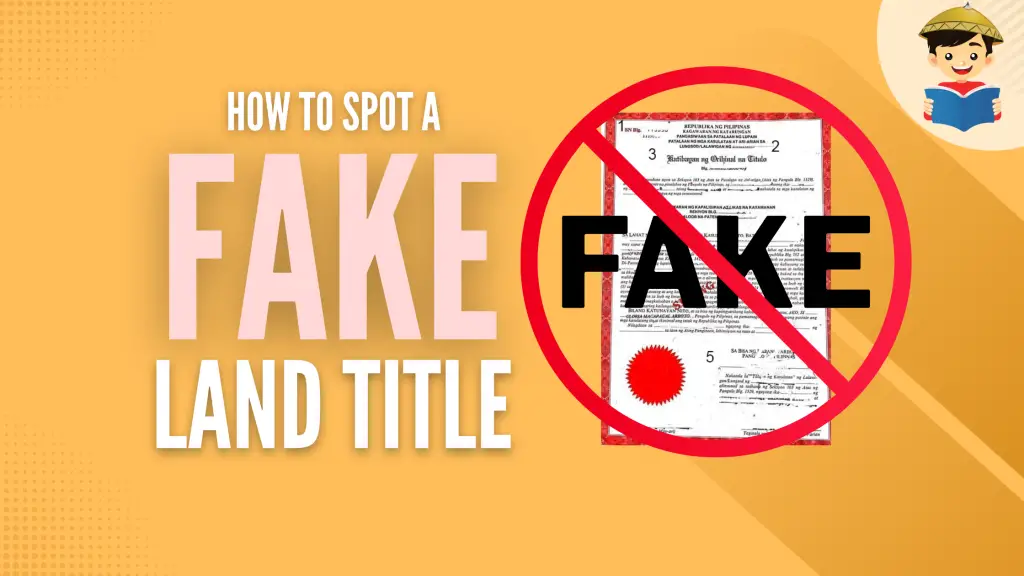
For most people, buying real property is probably one of the biggest investments of their life. If you are planning to buy land, how do you ensure you are not dealing with a fake land title?
With growing cases of fake titles1 in the Philippines, peddled by scrupulous individuals and syndicates2, conducting due diligence to ensure you are not duped into parting your money over a fake promise of a real title is essential.
In this article, let us discuss how you can spot a fake title in the Philippines and how to conduct due diligence when buying real property.
DISCLAIMER: This article has been written for general informational purposes only and is not legal advice or a substitute for legal counsel. You should contact your attorney to obtain advice with respect to any particular issue or problem. The use of the information contained herein does not create an attorney-client relationship between the author and the user/reader.
Table of Contents
- What Is a Fake Title?
- How To Spot a Fake Title: 3 Steps
- Seven Tips To Avoid Dealing With a Fake Title: A Guide for Buyers of Titled Land
- 1. Get the Photocopy of the Land Title To See Who the Registered Owner Is
- 2. Visit the Location of the Property and Conduct an Ocular Inspection
- 3. Request a Certified True Copy (CTC) of the Property at the LRA/Register of Deeds and Compare It With the Photocopy of the Title the Seller Gave You
- 4. Request a Traceback if the Document Is a Transfer Certificate of Title (TCT)
- 5. Go to the Assessor’s Office, Bring the Photocopy of the Title, and Ask for Its Tax Declaration
- 6. Ask for the Owner’s Duplicate Certificate Once You Have Finally Decided To Buy the Land; the Seller Should Give You the Original Owner’s Duplicate Certificate of Title
- 7. Go to a Real Notary Public and Execute the Deed of Sale
- Tips and Warnings
- Frequently Asked Questions
- 1. I am planning to buy a property with the seller showing only a Deed of Sale between him and the previous owner. How do I know if the Deed of Sale is legit and the notary public who notarized the document is not fake?
- 2. I bought land and found out later that the title is fake. What is my remedy against the person who sold the land to me?
- References
What Is a Fake Title?
By its name, a fake title is a non-existent title. It does not exist in the vault or the database of the Land Registration Authority (LRA) or the Register of Deeds (RD), or it does not have credible proof or evidence of its existence.
In the Philippines, a land title or the Certificate of Title has two copies. One is kept in the vault of the Register of Deeds (i.e., manually-issued title) or its database (i.e., eTitle). The other physical copy, the Owner’s Duplicate Copy, is kept by the registered owner. The registered owner uses the Owner’s Duplicate Copy when dealing with land.
However, even though the title has many built-in security features, it is still susceptible to forgery.
How To Spot a Fake Title: 3 Steps
Technology these days makes it easy to replicate documents. Scammers will always find a way to commit fraud. If they can counterfeit money, they can do the same to a land title. To avoid being scammed, here are some of the ways to spot a fake title:
1. Check the Paper Quality
Feel with your hand the paper’s texture. A land title uses a special type of paper with security features issued by the Bangko Sentral ng Pilipinas, so it does not feel like a bond paper or cartolina. The color is yellowish or a bit off-white, with dots and fibers stained on the paper. The manually-issued title is red-bordered while eTitle is blue-bordered. The title has the same texture as a banknote or check.
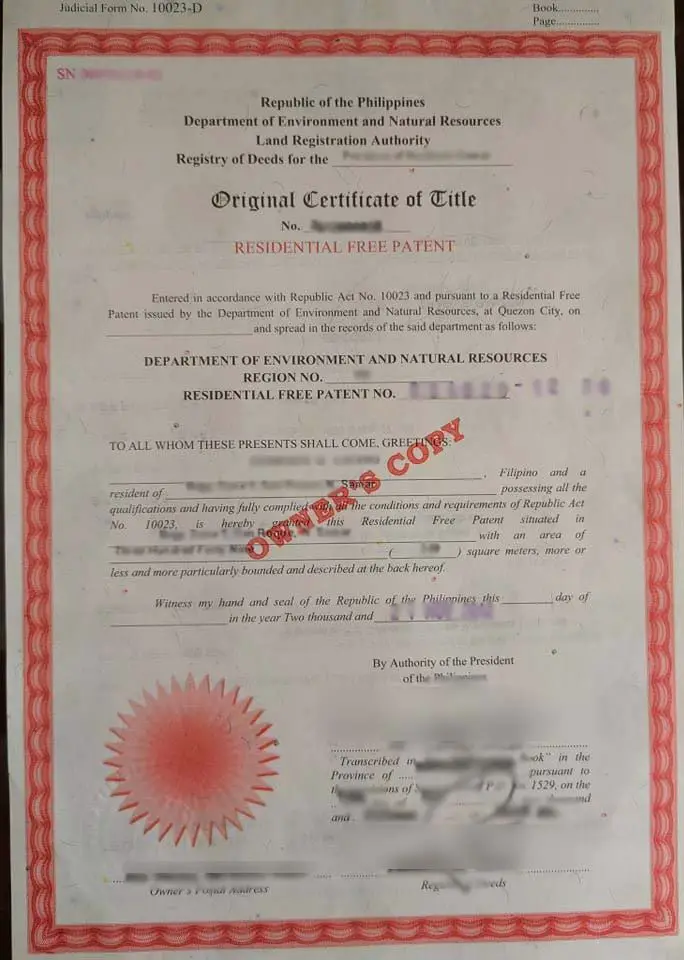
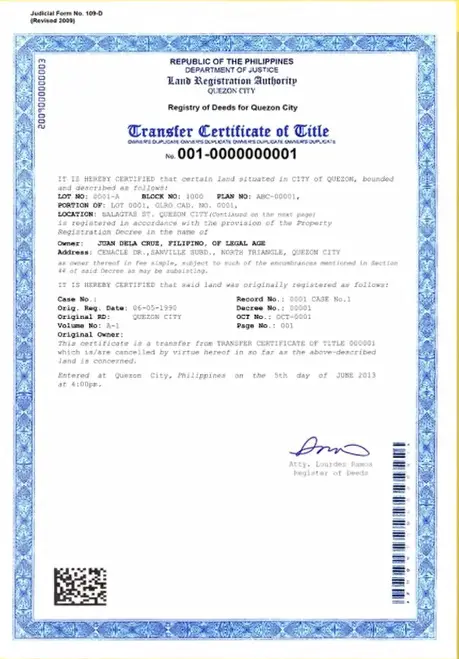
2. Inspect the Details Written on the Title
The title has a serial number, unique title number, and the signature of the issuing authority. You can see LRA’s watermark when you place the title against the light. With manually-issued titles, details such as the name of the registered owner, address, title number, and lot’s technical description are typewritten. With eTitle, the texts are computer encoded and have security features such as barcodes.
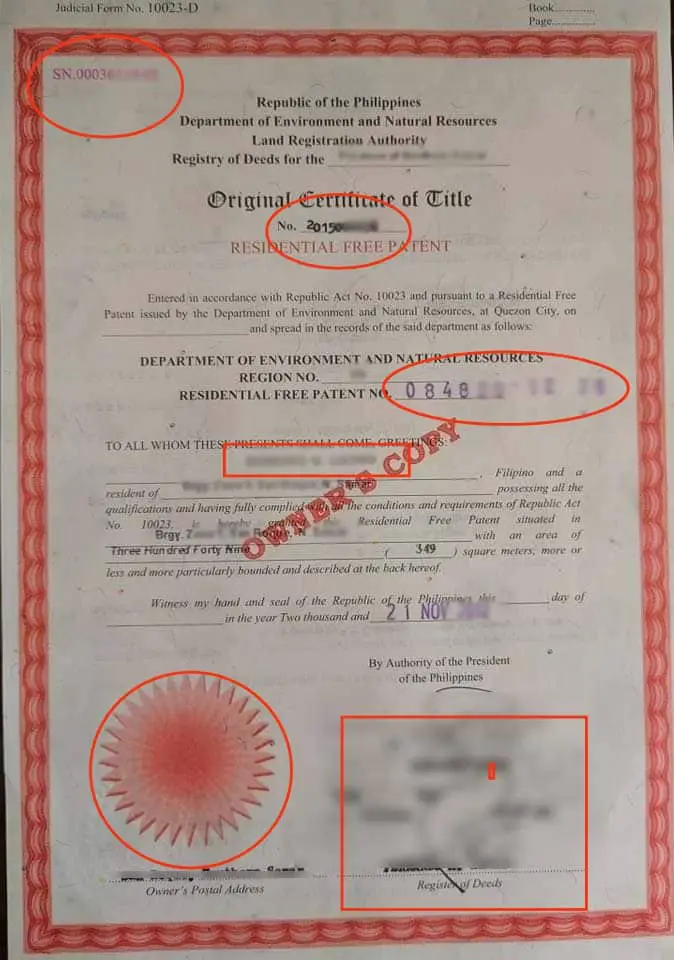
3. Compare With the Certified True Copy (CTC) Issued by the LRA/Registry of Deeds
Given the fraudster’s sophistication these days, it is sometimes difficult to spot a fake title as they can replicate a land title that looks and feels exactly like the original. For most of us, we have not even seen what a real land title looks like as we don’t deal with it every day as we do with paper money. The best way to spot a fake title is to request a CTC and see if the details of the title on your hand match with the LRA/RD CTC. Everything should be the same – from the serial numbers to the name, address, signatories, and technical description. It’s a red flag if some information is missing or not the same.
Seven Tips To Avoid Dealing With a Fake Title: A Guide for Buyers of Titled Land
Sometimes we get excited when a seller offers to sell a property at a cheap price. We immediately jump into buying the land because we fear others might steal a good deal. As a consequence, we get to buy problematic land with liens and encumbrances or worse – a fake title.
Due diligence is a must to avoid falling victim to fraud and scams. Per LRA’s advice, you should do the following when buying a titled property:
1. Get the Photocopy of the Land Title To See Who the Registered Owner Is
A legitimate seller should be able to give you a photocopy of the property’s title. Once you know the registered owner, conduct a background check, go to his or her address, and ask the neighbors about the owner’s identity.
If you are dealing with a broker or agent, ask about the owner’s identity and check if, indeed, the property is for sale. You should also check the broker’s or the agent’s authority to sell the property.
2. Visit the Location of the Property and Conduct an Ocular Inspection
Ask the seller to point to you the actual location and boundaries of the property. Bring a geodetic engineer so that the latter can confirm if the metes and bounds match the title’s technical description. There are cases where neighbors are overlapping their boundaries, or there are occupants on a portion of the property being sold, so you should be aware of these issues.
3. Request a Certified True Copy (CTC) of the Property at the LRA/Register of Deeds and Compare It With the Photocopy of the Title the Seller Gave You
Getting the CTC assures you that the title is legitimate and it exists in LRA’s vault or database. Once you have the CTC, compare the details to see if it matches with the photocopy. Check the CTC if the title is clean and has no liens and encumbrances annotated (e.g., the land is not mortgaged, no litigation involving the land, and no other claimant, among others).
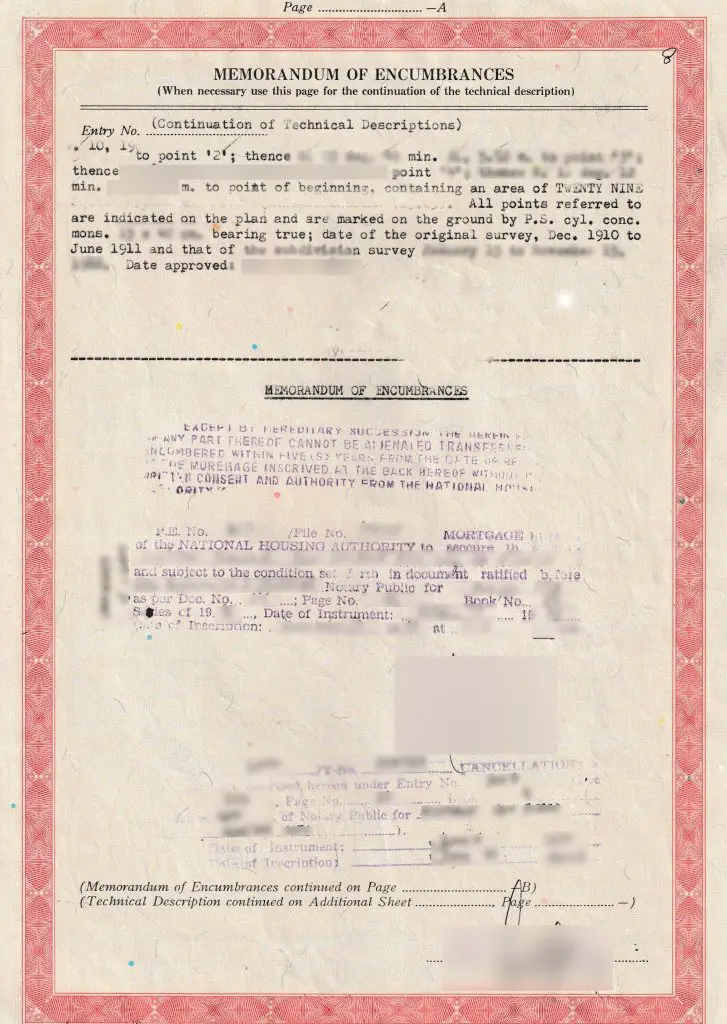
Requesting a CTC is now easy and convenient via LRA’s eSerbisyo Portal. Check out how to request a CTC here.
4. Request a Traceback if the Document Is a Transfer Certificate of Title (TCT)
Title Traceback, even up to several generations, is one of LRA’s offered services. You may request a photocopy of the previous TCTs issued on the title until its original registrant. You will also be able to know the previous owners and if transactions involving the land have been previously successful.
5. Go to the Assessor’s Office, Bring the Photocopy of the Title, and Ask for Its Tax Declaration
Check if the real estate tax payments are updated. If not, know how much is the outstanding liabilities. This is to ensure unpaid taxes are factored in with the contract price. There are many cases where the real estate taxes or amilyar have not been paid for several years, and the buyer only finds this information after the sale has been consummated.
6. Ask for the Owner’s Duplicate Certificate Once You Have Finally Decided To Buy the Land; the Seller Should Give You the Original Owner’s Duplicate Certificate of Title
You will not be able to transfer the land to your name if you cannot surrender the original to the Register of Deeds. If the owner’s copy is lost, you’ll have to undergo judicial or administrative proceedings to reconstitute the title.
7. Go to a Real Notary Public and Execute the Deed of Sale
Don’t go to a fake notary public you usually see on side streets. Ask the lawyer notarizing the Deed of Sale for advice about the provisions and clauses of the contract to make sure both parties understand its corresponding obligations (e.g., who pays the taxes, notarial fees).
Conducting due diligence before buying land could be a tedious process. It involves a lot of time, effort, and money. However, these activities are essential. After all, you are parting with your hard-earned money, so you should ensure you are only dealing with a legitimate seller with a real title to the land.
Tips and Warnings
- Directly deal with the registered owner or his or her duly authorized representative. Don’t be reluctant to ask for the Special Power of Attorney (SPA) if talking with agents or representatives. Sometimes, we are deep into negotiation with a person only to find out the agent or representative is not duly authorized to deal with the property or sign any documents. This is risky as the registered owner might deny the transaction later on.
- When buying titled land, always ask for all the pages of the Certificate of Title, including the page of the Memorandum of Encumbrance. Sometimes, the seller will only show the first page. However, it is crucial to check all pages including the Memorandum of Encumbrance, to see if there are annotations on the title. In some cases, you bought the land only to find out that the property is mortgaged or claimed by another person.
Frequently Asked Questions
1. I am planning to buy a property with the seller showing only a Deed of Sale between him and the previous owner. How do I know if the Deed of Sale is legit and the notary public who notarized the document is not fake?
If the document is notarized by a real notary public, the presumption is that the Deed of Sale is valid and duly executed by the parties. Sometimes it is easy to spot a document with fake notarization as it usually just has just a few details or 3-4 lines below the notary public’s name. To make sure you are not dealing with a fake document, you should:
a. Check the details and seal in the notarial certificate of the Deed of Sale. A real notary public should have the following information:
- His/her name and the word “Notary Public” and the province or city where the notary is commissioned
- His/her notarial commission number and the date of expiry
- Roll number, Professional Tax Receipts (PTR) number, and the place and date of issue
- Integrated Bar of the Philippines (IBP) Membership details
- Mandatory Continuing Legal Education (MCLE) details
The details above should look like the below sample:
Atty. JUAN DELA CRUZ
Notary Public for and in the City of Manila
Notarial Commission No. x-xxx until December 31, xxxx
No. 123, Tuazon St., Sampaloc, Manila
Roll No. xxxxx/ PTR No. xxxxxxx/ Jan. 2, xxxx
IBP No. xxxxxx
MCLE Compliance No. xx-xxxxxxx
b. Find out if the notary is a real person. You may visit the notary public’s address indicated in the notarial certificate or use Google to know if he/she is a real lawyer. The Supreme Court maintains a registry of all lawyers in the Philippines3.
c. If you cannot locate the notary public or he/she is already deceased, you may request a certified true copy of the Deed of Sale from the office of the Executive Judge of the Regional Trial Court where the notary public is commissioned. The notary public maintains a notarial register, which is required to be submitted to the court. You may also request from the National Archive.
2. I bought land and found out later that the title is fake. What is my remedy against the person who sold the land to me?
You may file a criminal case for swindling or estafa penalized under Art. 315 of the Revised Penal Code4 if all the elements of the crime are present. Depending on the circumstances, you may also file a falsification of documents penalized under Art. 172 of the RPC.
References
- Group uncovers 5,000 fake land titles in General Santos. (2014). Retrieved 4 July 2022, from https://www.manilatimes.net/2014/09/03/news/regions/group-uncovers-5000-fake-land-titles-general-santos/123825
- Iñigo, L. (2021). Syndicate selling fake land titles in Cagayan Valley busted. Retrieved 4 July 2022, from https://mb.com.ph/2021/03/26/syndicate-selling-fake-land-titles-in-cagayan-valley-busted/
- Law List A-Z. Retrieved 4 July 2022, from https://elibrary.judiciary.gov.ph/thebookshelf/showdocs/41/86978
- Official Gazette. The Revised Penal Code (1930).
Written by Atty. Kareen Lucero
Atty. Kareen Lucero
Kareen Lucero is a lawyer previously doing litigation before working for different agencies in the government and for a multinational corporation. She has traveled to 52+ countries including a 3-month solo backpacking in South East Asia and more than 1 year of solo traveling across four continents in the world. As part of giving back, she is passionate about sharing her knowledge of law and travel. She is currently doing consulting work for a government agency. For inquiries, you may reach her via Facebook Messenger (https://m.me/kareen.lucero.77) or email ([email protected]).
Copyright Notice
All materials contained on this site are protected by the Republic of the Philippines copyright law and may not be reproduced, distributed, transmitted, displayed, published, or broadcast without the prior written permission of filipiknow.net or in the case of third party materials, the owner of that content. You may not alter or remove any trademark, copyright, or other notice from copies of the content. Be warned that we have already reported and helped terminate several websites and YouTube channels for blatantly stealing our content. If you wish to use filipiknow.net content for commercial purposes, such as for content syndication, etc., please contact us at legal(at)filipiknow(dot)net
